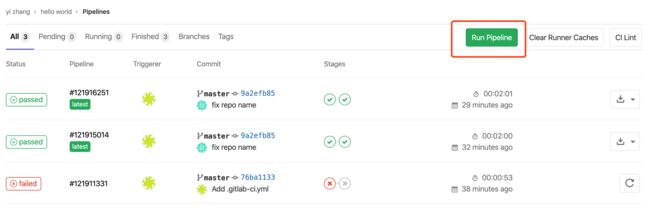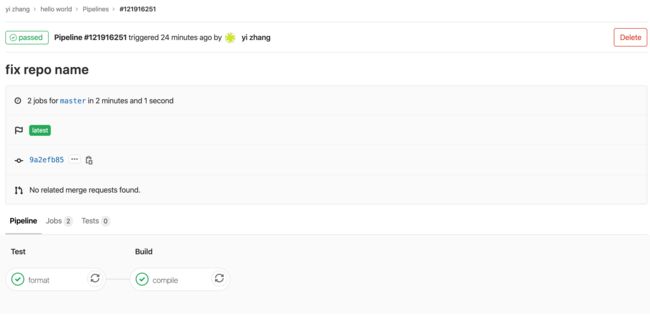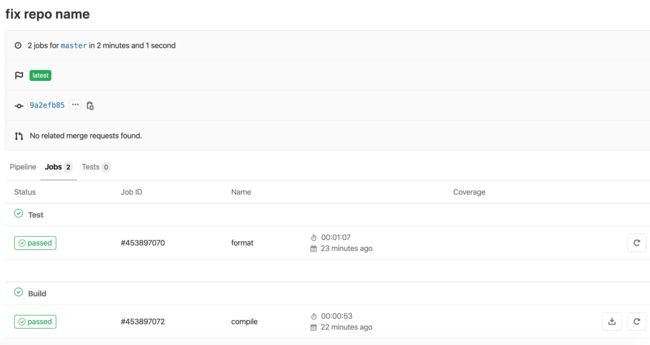- git自动化部署post-receive无效(转载至segmentfault的sowork回答)
php_M
phpgit
本人在linux服务器下搭建了gitlab,创建项目,git本地推送,都正常。但是服务器上如何才能映射到该项目?通过咨询,得知,需要Git自动化部署。网上找了办法,几乎都是post-receive,但是设置了后也没效果。最终在思否里面一个回答者的办法试了,管用了。如下:安装完git后,git自带有钩子脚本比如我们的仓库是/var/git-repository/myRepo.git//备注:如果找不
- DevOps工具链
zhangpeng455547940
devops运维
DevOps工具链的核心组成部分包括:代码编辑和版本控制工具svn、git自动化构建工具Jenkins、GitLabCI/CD、TravisCI持续集成和持续部署工具Jenkins、Ansible容器编排工具K8S、DockerSwarm持续监控工具Prometheus,Grafana,InfluxDB服务配置管理工具Ansible,Chef,PuppetGit:代码管理Maven:依赖管理、项目
- 【学习笔记】GitLab 使用技巧和说明和配置和使用方法
铜锣烧1号
pythongitgitlabpycharm
GitLab使用技巧和说明1.注册账号和登录注册账号:访问GitLab官网,点击“Signup”按钮,填写必要的信息(如用户名、邮箱、密码)完成注册。普通用户注册后需要管理员审批,如果有管理员权限可以直接登录使用。登录:使用注册的账号和密码登录GitLab。2.创建项目创建项目:登录后,点击页面右上角的加号图标,选择“Newproject”创建新项目。在项目创建页面,填写项目名称、描述和可见性等信
- GitLab安装和环境配置(虚拟机环境)
tanphilip
linuxgitlab
一.安装Gitlab前系统预配置准备工作1.关闭firewalld防火墙#systemctlstopfirewalld#systemctldisablefirewalld2.关闭SELINUX并重启系统#vi/etc/sysconfig/selinux...SELINUX=disabled...#reboot二.安装OmnibusGitlab-cepackage1.安装Gitlab组件#yum-y
- 代码托管平台对比分析:Gitee与GitLab
一、Gitee:本土化服务的深度实践者Gitee凭借对中国开发者需求的精准洞察,提供了多项针对性优化功能,尤其适合国内团队:高速稳定的访问体验服务器均部署于国内,代码拉取、推送及CI/CD流程的执行速度显著优于跨境平台,减少因网络延迟导致的协作中断。国内多节点加速技术保障了高并发场景下的稳定性,适合中大型团队集中式开发。合规与数据安全的双重保障严格遵守《数据安全法》《个人信息保护法》等国内法规,支
- GitLab多种场景下的备份与迁移指南
qzw1210
gitlabgitlab
GitLab备份与迁移完全指南GitLab作为一个完整的DevOps平台,其数据对于组织至关重要。无论是版本升级、服务器迁移还是灾难恢复,掌握GitLab的备份和迁移技术都是系统管理员的必备技能。本文将详细介绍GitLab的备份策略和各种场景下的迁移方法。目录GitLab备份基础知识OmnibusGitLab备份Docker环境下的GitLab备份Kubernetes环境下的GitLab备份迁移场
- GitLab配置ssh key
西北**孤狼
SHHgitssh运维
简介:一、背景当前很多公司都选择git作为代码版本控制工具,然后自己公司搭建私有的gitlab来管理代码,我们在clone代码的时候可以选择http协议,当然我们亦可以选择ssh协议来拉取代码。但是网上很少找到如何用git客户端生成sshkey,然后配置在gitlab,我当时在做的时候苦于摸索,后来终于找到了解决方案,那么本文,我们就来聊一聊如何本地git客户端生成sshkey,然后配置在gitl
- GitLab配置添加SSH Key
小羊绒
配置sshreactjs
工具gitbash1.配置姓名,邮箱配置姓名$gitconfig--globaluser.name"rongyang"配置邮箱$gitconfig--globaluser.email"
[email protected]"2.客户端配置生成SSH密钥对$ssh-keygen-trsa-C"
[email protected]"完成后在~/.ssh/会生成2个文件。id_rsa和id_
- gitlab 中文路径,无法下载?如何解决??
bug菌¹
全栈Bug调优(实战版)#CSDN问答解惑(全栈版)gitlabelasticsearchgithub
本文收录于《CSDN问答解答》专栏,主要记录项目实战过程中的Bug之前因后果及提供真实有效的解决方案,希望能够助你一臂之力,帮你早日登顶实现财富自由;同时,欢迎大家关注&&收藏&&订阅!持续更新中,up!up!up!!问题描述 gitlab中文路径,无法下载。问题遇到的现象和发生背景公司有人想从从网站下载项目的某个文件夹,当文件夹目录为英文时,能够正常下载,如果目录中有中文就会出现下载错误。此时
- Ansible集成Git的CI/CD流水线详解
wespten
Linux自动化运维智能运维性能监控系统调优TSansibleci/cd
Ansible是一款强大且易用的自动化工具,从简单的任务到复杂的多环境部署,Ansible提供了丰富的功能和灵活性。通过编写结构良好、易于维护的剧本,可以显著提高IT任务的效率和可靠性。将Ansible集成到CI/CD流程中,可以实现自动化的应用部署和测试。常见的集成方式包括:Jenkins:通过Jenkins插件或Pipeline,执行Ansible剧本进行部署。GitLabCI/CD:在Git
- VS2017拉取Gitlab上项目
daboluo@Niko
gitlab项目管理git
VS2017拉取Gitlab上项目简介一、需要准备的资源二、操作步骤简介最近的项目在Gitlab上,网上找了发现没有解决问题,于是自己熟悉了下。记录一下从gitlab仓库git到vs2017的过程。一、需要准备的资源安装好VisualStudio2017(其他版本也可以,操作可能会不太一样)。管理员为你创建的GitLab账号、密码。GitLab账号权限可以查看的项目。二、操作步骤可以先用web登录
- GitLab:GitLab问题追踪与项目协作_2024-07-18_01-47-52.Tex
chenjj4003
游戏开发gitlabgithubgitelasticsearch大数据
GitLab:GitLab问题追踪与项目协作GitLab基础介绍GitLab的历史与发展GitLab是一个开源的版本控制系统,最初由乌克兰开发者DmitriyZaporozhets和ValerySizov在2011年创建。它最初是作为GitHub的一个替代品而设计的,旨在提供一个自我托管的Git仓库管理工具。GitLab的第一个版本是在RubyonRails上构建的,随着时间的推移,它逐渐发展成为
- 使用IDEA拉取GitLab项目
strong-1024
gitlab
使用组长提供的socket和账号密码登录内网的GitLab:打开IDEA新建项目,ProjectfromVersionControl在项目路径后面添加.git:
- 拉取gitlab项目时出现500的错误的权限问题
one 大白(●—●)
gitlab
title:拉取gitlab项目时出现500的错误的权限问题date:2025-03-1018:09:08tags:gitlabgit拉取gitlab项目时出现500的错误的权限问题Gitlab克隆代码**我遇到的问题错误**:**问题解决步骤**:1、确定你可以浏览器访问到项目页面2、确定你的邮箱或账号已添加,有权限可以拉取项目**解决步骤**本地拉取代码时生成ssh密钥:密钥查看地址:此步骤完
- jenkins+maven+docker java项目编译、打包、构建镜像、上传私有仓库、web容器部署
大敌
docker自动化运维jenkinsdocker运维
本环境非常简单,主要实现如下流程功能员工通过eclipse提交java代码———gitlab更新代码————jenkins通过maven编译打包————生成war包————制作docker镜像并上传到私有仓库————web服务器下载镜像————运行容器对外服务部分说明:jenkins服务器上已经安装了maven,并已配置。jenkins服务器上安装docker服务。(打包镜像,并上传至私有仓库)提
- 确保代码质量和系统的可持续发展能力
徐福记c
运维运维
为确保代码质量和系统的可持续发展能力,从规范代码、审查质量、保障可维护性及配置自动化流程四方面着手,为系统的长远发展打下坚实基础。一、确保代码质量及可维护性的方案规范代码编写:要求开发人员遵循行业认可的编码规范,如阿里巴巴Java开发手册等,使代码结构清晰、变量命名准确、注释详细,便于后续维护人员快速理解。审查代码质量:利用GitLabCICD集成SonarQube工具扫描代码,设置质量门禁,对严
- 7款敏捷项目管理系统对比,让进度追踪更高效
敏捷
本文主要分享7款主流敏捷项目管理系统:1.PingCode;2.TAPD;3.YesDev;4.Jira;5.Targetprocess;6.GitLab(国内版本);7.ClickUp。在如今快速变化的商业环境中,项目管理工具越来越成为团队高效协作和成功交付的关键。尤其是对于采用敏捷方法的团队来说,选择合适的敏捷项目管理系统不仅能够提升工作效率,还能帮助团队更好地适应市场需求和项目变更。然而,面
- 7款敏捷项目管理系统对比,让进度追踪更高效
敏捷
本文主要分享7款主流敏捷项目管理系统:1.PingCode;2.TAPD;3.YesDev;4.Jira;5.Targetprocess;6.GitLab(国内版本);7.ClickUp。在如今快速变化的商业环境中,项目管理工具越来越成为团队高效协作和成功交付的关键。尤其是对于采用敏捷方法的团队来说,选择合适的敏捷项目管理系统不仅能够提升工作效率,还能帮助团队更好地适应市场需求和项目变更。然而,面
- 完整的Devops流程
河越柯衍
devops
完整的Devops流程Tips:Jenkins是开源的CI&CD工具,提供超过1000个插件来支持构建、部署、自动化,满足任何项目的需要。完整的Devops流程:开发提交代码到代码仓库gitlab>>Jenkins检测到代码更新>>调用k8sapi在k8s中创建Jenkinsslavepod>>Jenkinsslavepod拉取代码>>通过maven把拉取的代码进行构建成war包或者jar包>>上
- 小团队的极简自动化运维方案(基于华为云)
徐福记c
运维运维
结合华为云原生服务和极简工具链实现高效可控的自动化部署:一、架构简化设计(适配小团队)1.部署模式选择graphLRGitLab-->|推送代码|GitLab-CI-->|构建镜像|华为云SWR(容器镜像仓库)GitLab-CI-->|执行部署|华为云CCI(云容器实例)-->|对外服务|ELB(华为云弹性负载均衡)华为云CCI-->|数据存储|RDS(华为云数据库)放弃K8s:使用华为云CCI(
- 敏捷开发之自动化流水线
舒旻
敏捷项目管理devops敏捷流程scrum软件工程敏捷开发
自动化流水线就像给软件交付装上了「智能检测仪」,每个环节自动过滤风险,确保最终交付物既安全又高质量。以下是一个在线教育平台支付系统升级的实战案例,完整展示从开发到上线的全流程。以下是「在线教育平台支付系统升级」案例的完整责任矩阵:责任分工框架环节主要责任人协作角色关键交付物协作工具1.代码开发与提交后端开发工程师技术负责人、产品经理功能代码、单元测试GitLab、JIRA2.代码安全审查安全工程师
- app上架vivo应用商店流程
奔跑吧邓邓子
企业运营
提示:“奔跑吧邓邓子”的高效运维专栏聚焦于各类运维场景中的实际操作与问题解决。内容涵盖服务器硬件(如IBMSystem3650M5)、云服务平台(如腾讯云、华为云)、服务器软件(如Nginx、Apache、GitLab、Redis、Elasticsearch、Kubernetes、Docker等)、开发工具(如Git、HBuilder)以及网络安全(如挖矿病毒排查、SSL证书配置)等多个方面。无论
- git从本地其他设备上fetch分支
绛洞花主敏明
Gitgit
在Git中,如果你想从本地其他设备上获取分支,可以通过以下几种方式实现。不过,需要注意的是,Git本身是分布式版本控制系统,通常我们是从远程仓库(如GitHub、GitLab等)拉取分支,而不是直接从本地其他设备上操作。但如果确实需要从本地其他设备上获取分支,可以通过以下方法:方法一:将本地仓库设置为远程仓库你可以将本地其他设备上的仓库设置为当前设备上的远程仓库,然后通过gitfetch操作来获取
- 极狐GitLab签约银河证券,助力证券行业打造更高标准的 DevOps 平台
git
客户背景银河证券正处于数字化转型的关键时期,使金融科技持续赋能业务转型升级。在转型过程中,提升IT研发效能是实现研发生产力变革的重要发展举措,自2021年起,银河证券探索提升软件研发效能的解决方案,DevOps工具链作为承载开发、技术运营和质量保障部门之间沟通、协作与整合的研发基础设施,承担起加强业务与技术协作的责任、快速响应市场变化,持续优化产品和服务。在此背景下,极狐Gitlab企业版被客户纳
- GitLab 发布安全补丁版本17.6.1, 17.5.3, 17.4.5
本分分享极狐GitLab补丁版本17.6.1,17.5.3,17.4.5的详细内容。这几个版本包含重要的缺陷和安全修复代码,我们强烈建议所有私有化部署用户应该立即升级到上述的某一个版本。对于极狐GitLabSaaS,技术团队已经进行了升级,无需用户采取任何措施。极狐GitLab正式推出面向GitLab老旧版本的专业升级服务【https://dl.gitlab.cn/xemzy70j】,专业技术人员
- GitLab 密钥详解:如何安全地使用 SSH 密钥进行身份验证
Crazy learner
Linux基本命令gitlab安全ssh
目录一、什么是GitLabSSH密钥?二、为什么要使用SSH密钥?三、如何生成SSH密钥?1.Linux/macOS2.Windows四、将公钥添加到GitLab五、配置SSH客户端六、常见问题及解决方案七、总结GitLab是一个功能强大的Git仓库管理平台,它支持通过SSH密钥进行身份验证,提供了比传统的用户名和密码登录方式更安全的认证机制。本文将深入探讨GitLab的SSH密钥,包括如何生成、
- AI生成的web框架 包含前后端 k8s管理等
LCY133
人工智能前端kubernetes
好的,我现在需要根据用户提供的技术栈来设计一个Web平台的搭建方案。用户提到的技术包括前端、后端、算法,GitLab、Jenkins,阿里云ACK和ECS,MongoDB、Redis,Docker、K8s、Nginx。我需要综合考虑这些技术的整合,确保整个架构的高效、可靠和可扩展。首先,用户之前已经得到了一个架构方案,现在可能希望进一步细化或者调整。我需要回顾之前的方案,看看是否有遗漏或可以优化的
- 解释 Git 的基本概念和使用方式
liuhaoran___
git
Git是一种分布式版本控制系统,用于跟踪文件和文件夹的变化,以便多人协作开发代码、管理项目和跟踪代码变更历史。以下是Git的基本概念和使用方式:仓库(Repository):Git仓库是保存代码的地方。它可以是本地仓库(在个人计算机上)或远程仓库(如GitHub、GitLab、Bitbucket等)。通过克隆(clone)一个远程仓库,你可以在本地机器上创建一个副本。提交(Commit):提交是保
- IgH详解 一、概述
EtherCAT.技术研究
IgH详解ethercat
IgH源码地址:EtherLab/EtherCAT·GitLabIgH是开源的EtherCAT主站协议栈,虽然功能上和从站兼容性比不上商业协议栈,但完全能满足学习和普通场景的使用,公司也可以基于IgH作产品开发,基本能满足大部分使用场景。如有项目需求,欢迎沟通交流。本系列博客主要分为三部分1、介绍IgH主站ec_master运行流程;2、介绍IgH对网卡驱动的实时性优化;3、IgH上层应用程序开发
- python docx document 输出word 设置字体
南阳范宏云
pythonword开发语言
python相关学习资料:一张图生成指定动作的动态视频,MagicAnimate本地部署搭建私人助理大模型需要什么环境?GitLabCI/CD-pending的原因使用Python-docx库设置Word文档字体Python-docx是一个用于创建和更新MicrosoftWord文档的Python库。它允许我们以编程方式操作Word文档,包括设置字体样式。本文将介绍如何使用Python-docx库
- scala的option和some
矮蛋蛋
编程scala
原文地址:
http://blog.sina.com.cn/s/blog_68af3f090100qkt8.html
对于学习 Scala 的 Java™ 开发人员来说,对象是一个比较自然、简单的入口点。在 本系列 前几期文章中,我介绍了 Scala 中一些面向对象的编程方法,这些方法实际上与 Java 编程的区别不是很大。我还向您展示了 Scala 如何重新应用传统的面向对象概念,找到其缺点
- NullPointerException
Cb123456
androidBaseAdapter
java.lang.NullPointerException: Attempt to invoke virtual method 'int android.view.View.getImportantForAccessibility()' on a null object reference
出现以上异常.然后就在baidu上
- PHP使用文件和目录
天子之骄
php文件和目录读取和写入php验证文件php锁定文件
PHP使用文件和目录
1.使用include()包含文件
(1):使用include()从一个被包含文档返回一个值
(2):在控制结构中使用include()
include_once()函数需要一个包含文件的路径,此外,第一次调用它的情况和include()一样,如果在脚本执行中再次对同一个文件调用,那么这个文件不会再次包含。
在php.ini文件中设置
- SQL SELECT DISTINCT 语句
何必如此
sql
SELECT DISTINCT 语句用于返回唯一不同的值。
SQL SELECT DISTINCT 语句
在表中,一个列可能会包含多个重复值,有时您也许希望仅仅列出不同(distinct)的值。
DISTINCT 关键词用于返回唯一不同的值。
SQL SELECT DISTINCT 语法
SELECT DISTINCT column_name,column_name
F
- java冒泡排序
3213213333332132
java冒泡排序
package com.algorithm;
/**
* @Description 冒泡
* @author FuJianyong
* 2015-1-22上午09:58:39
*/
public class MaoPao {
public static void main(String[] args) {
int[] mao = {17,50,26,18,9,10
- struts2.18 +json,struts2-json-plugin-2.1.8.1.jar配置及问题!
7454103
DAOspringAjaxjsonqq
struts2.18 出来有段时间了! (貌似是 稳定版)
闲时研究下下! 貌似 sruts2 搭配 json 做 ajax 很吃香!
实践了下下! 不当之处请绕过! 呵呵
网上一大堆 struts2+json 不过大多的json 插件 都是 jsonplugin.34.jar
strut
- struts2 数据标签说明
darkranger
jspbeanstrutsservletScheme
数据标签主要用于提供各种数据访问相关的功能,包括显示一个Action里的属性,以及生成国际化输出等功能
数据标签主要包括:
action :该标签用于在JSP页面中直接调用一个Action,通过指定executeResult参数,还可将该Action的处理结果包含到本页面来。
bean :该标签用于创建一个javabean实例。如果指定了id属性,则可以将创建的javabean实例放入Sta
- 链表.简单的链表节点构建
aijuans
编程技巧
/*编程环境WIN-TC*/ #include "stdio.h" #include "conio.h"
#define NODE(name, key_word, help) \ Node name[1]={{NULL, NULL, NULL, key_word, help}}
typedef struct node { &nbs
- tomcat下jndi的三种配置方式
avords
tomcat
jndi(Java Naming and Directory Interface,Java命名和目录接口)是一组在Java应用中访问命名和目录服务的API。命名服务将名称和对象联系起来,使得我们可以用名称
访问对象。目录服务是一种命名服务,在这种服务里,对象不但有名称,还有属性。
tomcat配置
- 关于敏捷的一些想法
houxinyou
敏捷
从网上看到这样一句话:“敏捷开发的最重要目标就是:满足用户多变的需求,说白了就是最大程度的让客户满意。”
感觉表达的不太清楚。
感觉容易被人误解的地方主要在“用户多变的需求”上。
第一种多变,实际上就是没有从根本上了解了用户的需求。用户的需求实际是稳定的,只是比较多,也比较混乱,用户一般只能了解自己的那一小部分,所以没有用户能清楚的表达出整体需求。而由于各种条件的,用户表达自己那一部分时也有
- 富养还是穷养,决定孩子的一生
bijian1013
教育人生
是什么决定孩子未来物质能否丰盛?为什么说寒门很难出贵子,三代才能出贵族?真的是父母必须有钱,才能大概率保证孩子未来富有吗?-----作者:@李雪爱与自由
事实并非由物质决定,而是由心灵决定。一朋友富有而且修养气质很好,兄弟姐妹也都如此。她的童年时代,物质上大家都很贫乏,但妈妈总是保持生活中的美感,时不时给孩子们带回一些美好小玩意,从来不对孩子传递生活艰辛、金钱来之不易、要懂得珍惜
- oracle 日期时间格式转化
征客丶
oracle
oracle 系统时间有 SYSDATE 与 SYSTIMESTAMP;
SYSDATE:不支持毫秒,取的是系统时间;
SYSTIMESTAMP:支持毫秒,日期,时间是给时区转换的,秒和毫秒是取的系统的。
日期转字符窜:
一、不取毫秒:
TO_CHAR(SYSDATE, 'YYYY-MM-DD HH24:MI:SS')
简要说明,
YYYY 年
MM 月
- 【Scala六】分析Spark源代码总结的Scala语法四
bit1129
scala
1. apply语法
FileShuffleBlockManager中定义的类ShuffleFileGroup,定义:
private class ShuffleFileGroup(val shuffleId: Int, val fileId: Int, val files: Array[File]) {
...
def apply(bucketId
- Erlang中有意思的bug
bookjovi
erlang
代码中常有一些很搞笑的bug,如下面的一行代码被调用两次(Erlang beam)
commit f667e4a47b07b07ed035073b94d699ff5fe0ba9b
Author: Jovi Zhang <
[email protected]>
Date: Fri Dec 2 16:19:22 2011 +0100
erts:
- 移位打印10进制数转16进制-2008-08-18
ljy325
java基础
/**
* Description 移位打印10进制的16进制形式
* Creation Date 15-08-2008 9:00
* @author 卢俊宇
* @version 1.0
*
*/
public class PrintHex {
// 备选字符
static final char di
- 读《研磨设计模式》-代码笔记-组合模式
bylijinnan
java设计模式
声明: 本文只为方便我个人查阅和理解,详细的分析以及源代码请移步 原作者的博客http://chjavach.iteye.com/
import java.util.ArrayList;
import java.util.List;
abstract class Component {
public abstract void printStruct(Str
- 利用cmd命令将.class文件打包成jar
chenyu19891124
cmdjar
cmd命令打jar是如下实现:
在运行里输入cmd,利用cmd命令进入到本地的工作盘符。(如我的是D盘下的文件有此路径 D:\workspace\prpall\WEB-INF\classes)
现在是想把D:\workspace\prpall\WEB-INF\classes路径下所有的文件打包成prpall.jar。然后继续如下操作:
cd D: 回车
cd workspace/prpal
- [原创]JWFD v0.96 工作流系统二次开发包 for Eclipse 简要说明
comsci
eclipse设计模式算法工作swing
JWFD v0.96 工作流系统二次开发包 for Eclipse 简要说明
&nb
- SecureCRT右键粘贴的设置
daizj
secureCRT右键粘贴
一般都习惯鼠标右键自动粘贴的功能,对于SecureCRT6.7.5 ,这个功能也已经是默认配置了。
老版本的SecureCRT其实也有这个功能,只是不是默认设置,很多人不知道罢了。
菜单:
Options->Global Options ...->Terminal
右边有个Mouse的选项块。
Copy on Select
Paste on Right/Middle
- Linux 软链接和硬链接
dongwei_6688
linux
1.Linux链接概念Linux链接分两种,一种被称为硬链接(Hard Link),另一种被称为符号链接(Symbolic Link)。默认情况下,ln命令产生硬链接。
【硬连接】硬连接指通过索引节点来进行连接。在Linux的文件系统中,保存在磁盘分区中的文件不管是什么类型都给它分配一个编号,称为索引节点号(Inode Index)。在Linux中,多个文件名指向同一索引节点是存在的。一般这种连
- DIV底部自适应
dcj3sjt126com
JavaScript
<!DOCTYPE html PUBLIC "-//W3C//DTD XHTML 1.0 Transitional//EN" "http://www.w3.org/TR/xhtml1/DTD/xhtml1-transitional.dtd">
<html xmlns="http://www.w3.org/1999/xhtml&q
- Centos6.5使用yum安装mysql——快速上手必备
dcj3sjt126com
mysql
第1步、yum安装mysql
[root@stonex ~]# yum -y install mysql-server
安装结果:
Installed:
mysql-server.x86_64 0:5.1.73-3.el6_5 &nb
- 如何调试JDK源码
frank1234
jdk
相信各位小伙伴们跟我一样,想通过JDK源码来学习Java,比如collections包,java.util.concurrent包。
可惜的是sun提供的jdk并不能查看运行中的局部变量,需要重新编译一下rt.jar。
下面是编译jdk的具体步骤:
1.把C:\java\jdk1.6.0_26\sr
- Maximal Rectangle
hcx2013
max
Given a 2D binary matrix filled with 0's and 1's, find the largest rectangle containing all ones and return its area.
public class Solution {
public int maximalRectangle(char[][] matrix)
- Spring MVC测试框架详解——服务端测试
jinnianshilongnian
spring mvc test
随着RESTful Web Service的流行,测试对外的Service是否满足期望也变的必要的。从Spring 3.2开始Spring了Spring Web测试框架,如果版本低于3.2,请使用spring-test-mvc项目(合并到spring3.2中了)。
Spring MVC测试框架提供了对服务器端和客户端(基于RestTemplate的客户端)提供了支持。
&nbs
- Linux64位操作系统(CentOS6.6)上如何编译hadoop2.4.0
liyong0802
hadoop
一、准备编译软件
1.在官网下载jdk1.7、maven3.2.1、ant1.9.4,解压设置好环境变量就可以用。
环境变量设置如下:
(1)执行vim /etc/profile
(2)在文件尾部加入:
export JAVA_HOME=/home/spark/jdk1.7
export MAVEN_HOME=/ho
- StatusBar 字体白色
pangyulei
status
[[UIApplication sharedApplication] setStatusBarStyle:UIStatusBarStyleLightContent];
/*you'll also need to set UIViewControllerBasedStatusBarAppearance to NO in the plist file if you use this method
- 如何分析Java虚拟机死锁
sesame
javathreadoracle虚拟机jdbc
英文资料:
Thread Dump and Concurrency Locks
Thread dumps are very useful for diagnosing synchronization related problems such as deadlocks on object monitors. Ctrl-\ on Solaris/Linux or Ctrl-B
- 位运算简介及实用技巧(一):基础篇
tw_wangzhengquan
位运算
http://www.matrix67.com/blog/archives/263
去年年底写的关于位运算的日志是这个Blog里少数大受欢迎的文章之一,很多人都希望我能不断完善那篇文章。后来我看到了不少其它的资料,学习到了更多关于位运算的知识,有了重新整理位运算技巧的想法。从今天起我就开始写这一系列位运算讲解文章,与其说是原来那篇文章的follow-up,不如说是一个r
- jsearch的索引文件结构
yangshangchuan
搜索引擎jsearch全文检索信息检索word分词
jsearch是一个高性能的全文检索工具包,基于倒排索引,基于java8,类似于lucene,但更轻量级。
jsearch的索引文件结构定义如下:
1、一个词的索引由=分割的三部分组成: 第一部分是词 第二部分是这个词在多少


